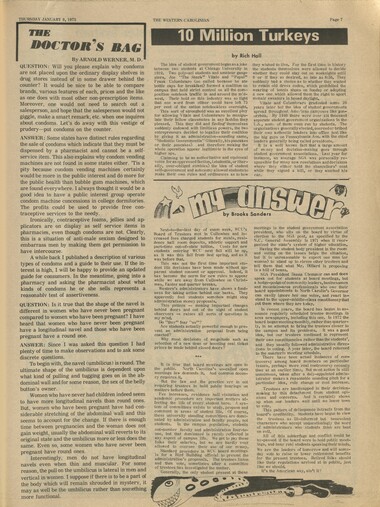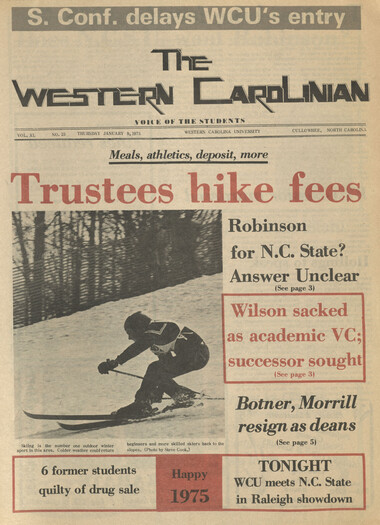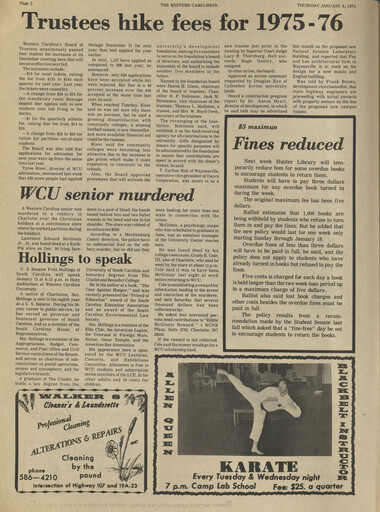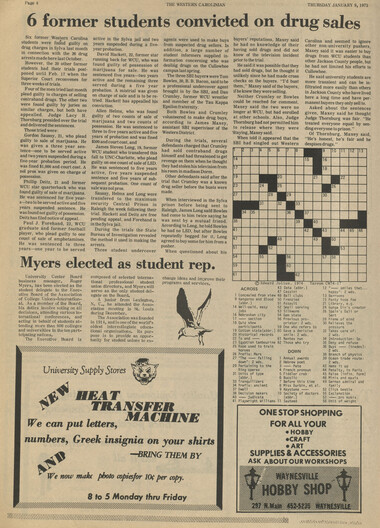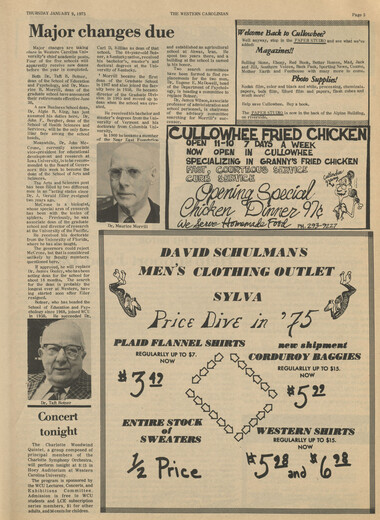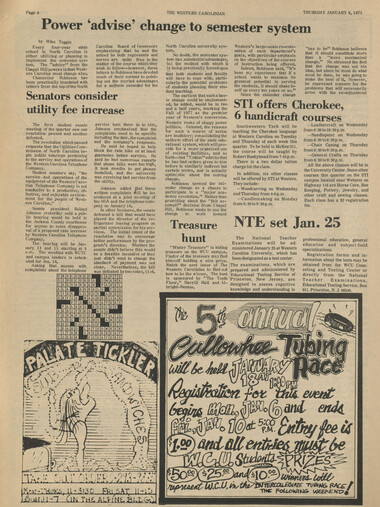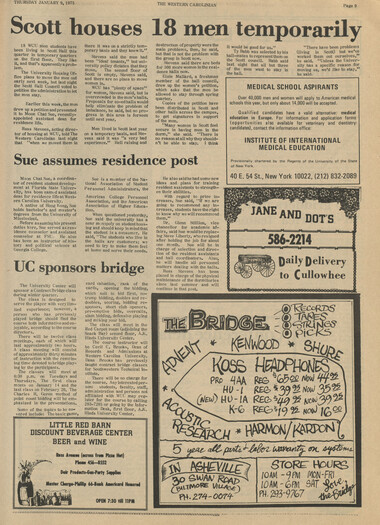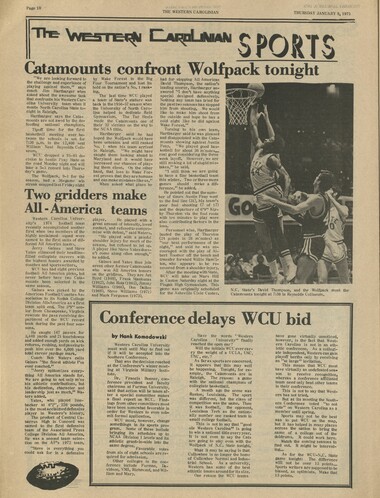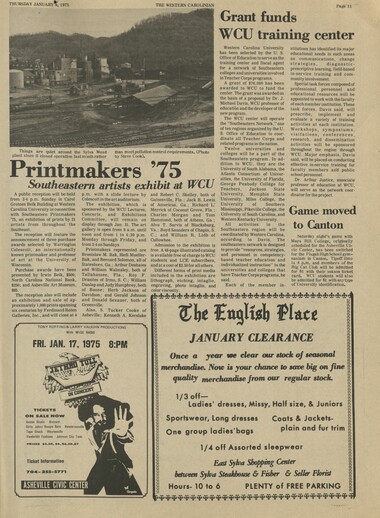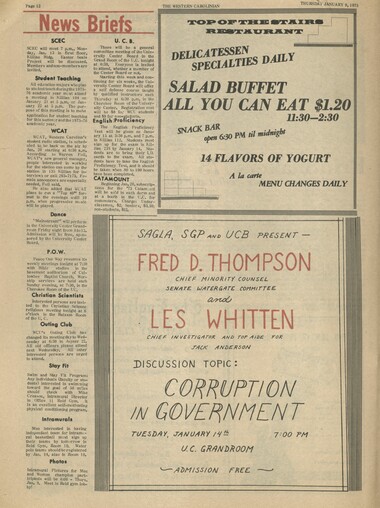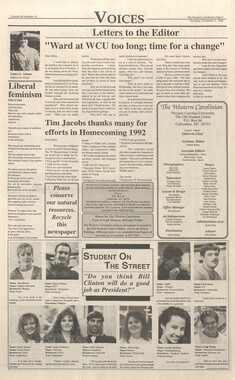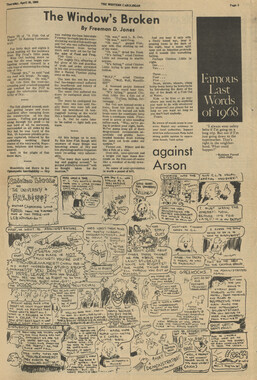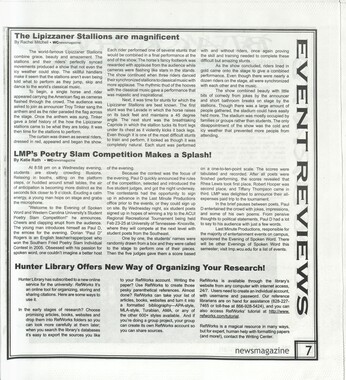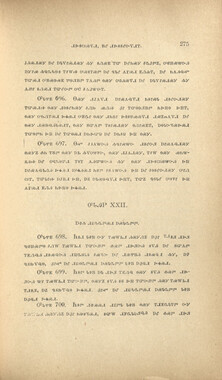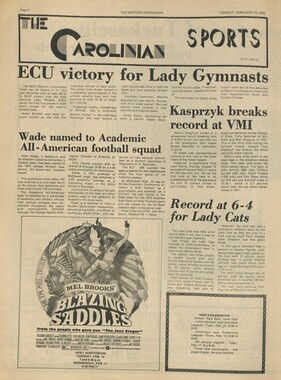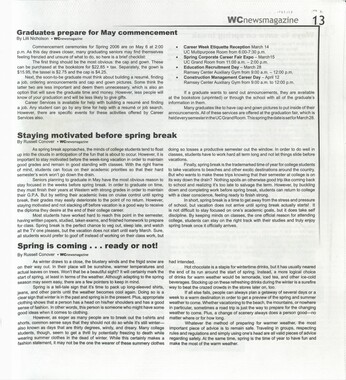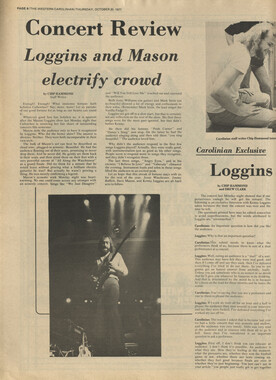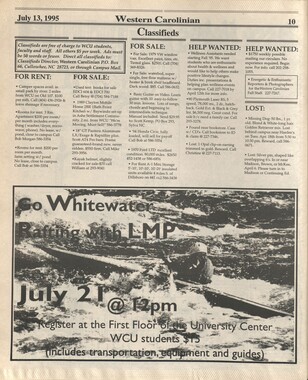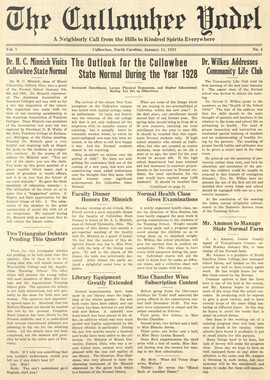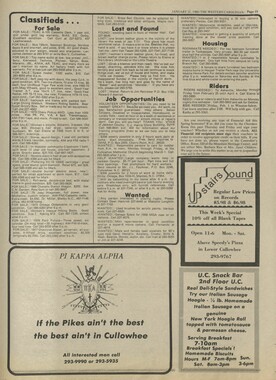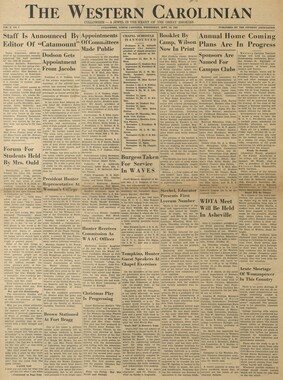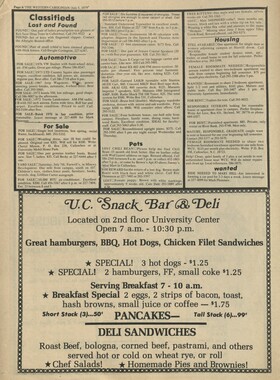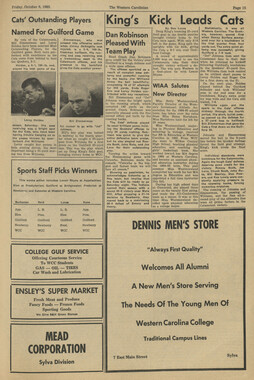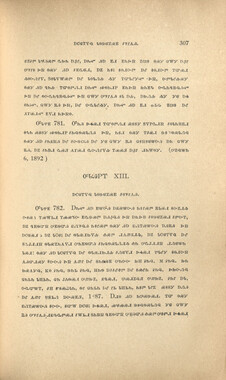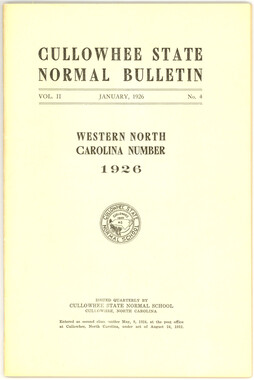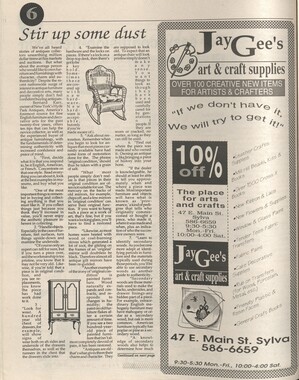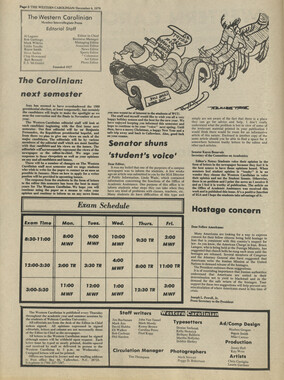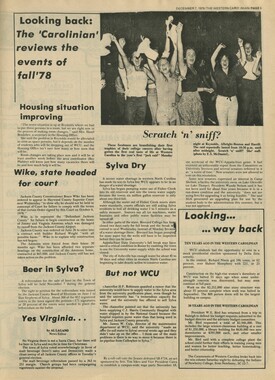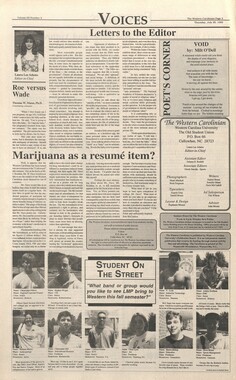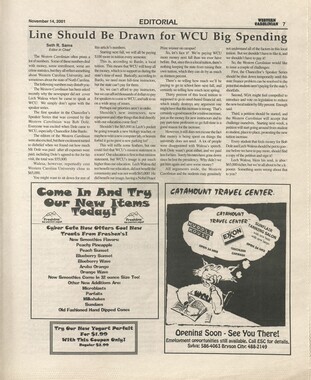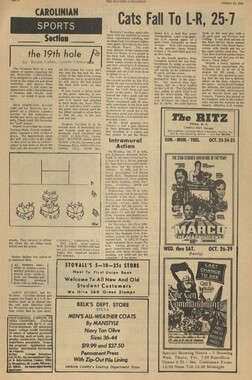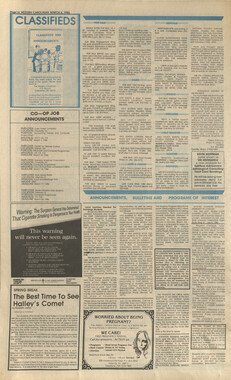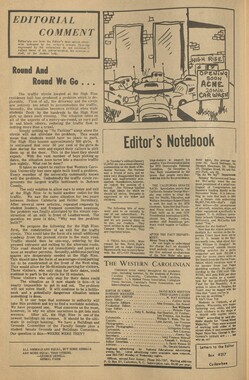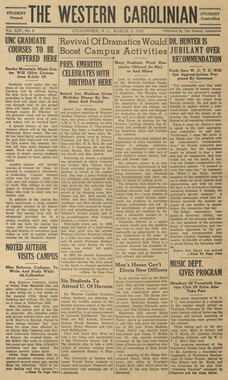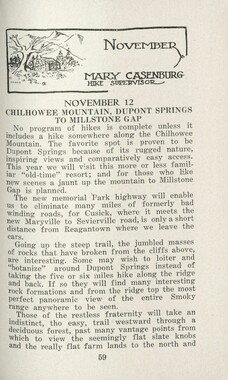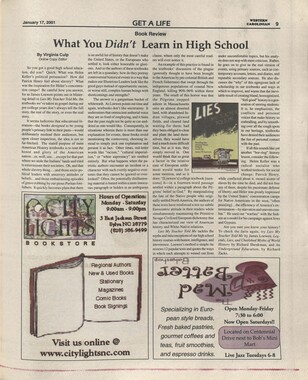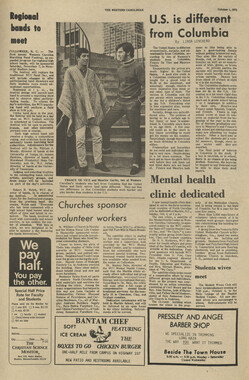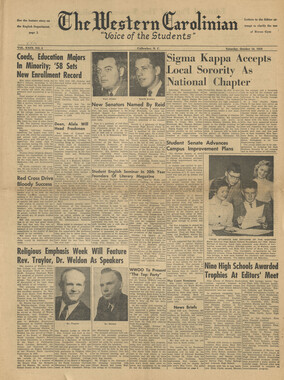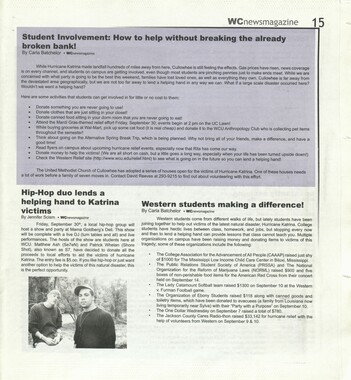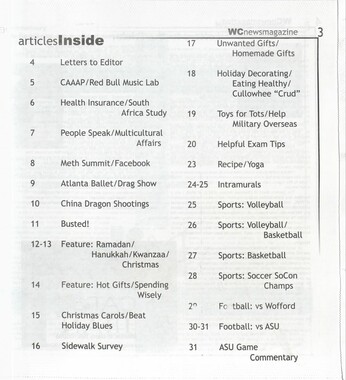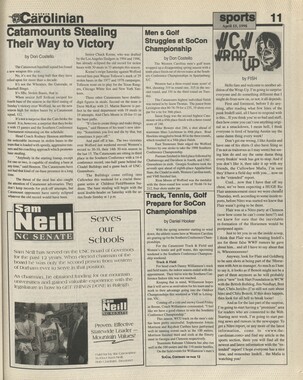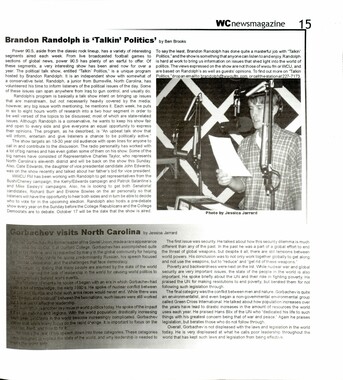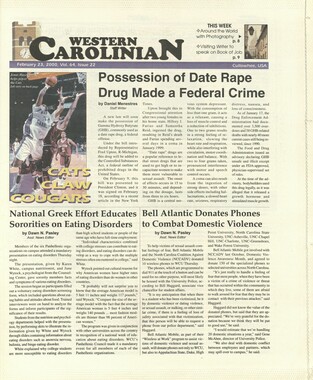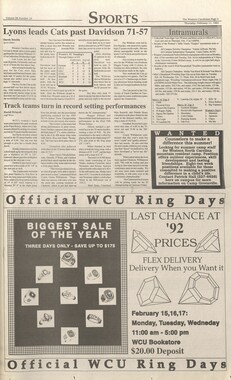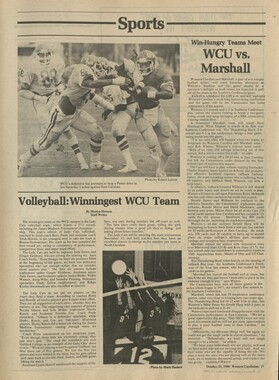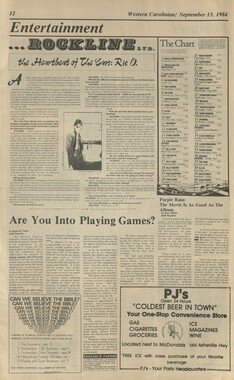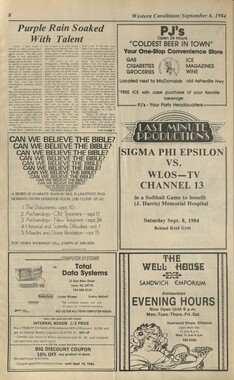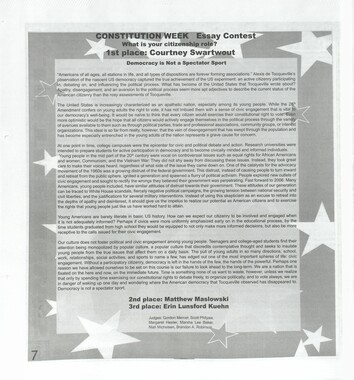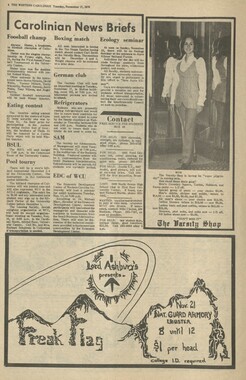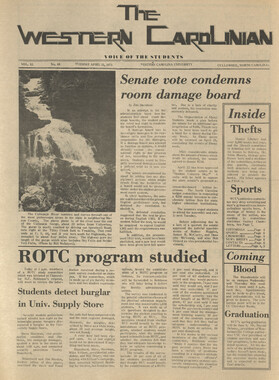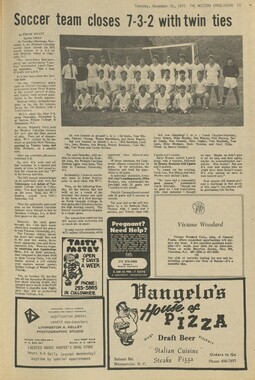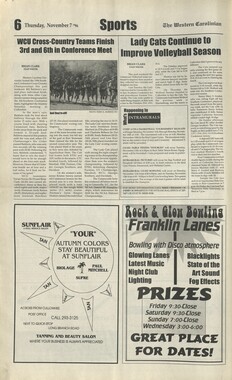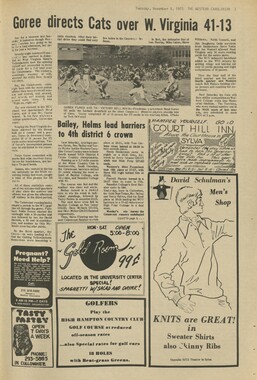Western Carolina University (21)
View all
- Canton Champion Fibre Company (2308)
- Cherokee Traditions (291)
- Civil War in Southern Appalachia (165)
- Craft Revival (1942)
- George Masa Collection (137)
- Great Smoky Mountains - A Park for America (3080)
- Highlights from Western Carolina University (422)
- Horace Kephart (973)
- Journeys Through Jackson (159)
- LGBTQIA+ Archive of Jackson County (89)
- Oral Histories of Western North Carolina (318)
- Picturing Appalachia (6617)
- Stories of Mountain Folk (413)
- Travel Western North Carolina (153)
- Western Carolina University Fine Art Museum Vitreograph Collection (129)
- Western Carolina University Herbarium (92)
- Western Carolina University: Making Memories (738)
- Western Carolina University Publications (2491)
- Western Carolina University Restricted Electronic Theses and Dissertations (146)
- Western North Carolina Regional Maps (71)
- World War II in Southern Appalachia (131)
University of North Carolina Asheville (6)
View all
- Allanstand Cottage Industries (62)
- Appalachian National Park Association (53)
- Bennett, Kelly, 1890-1974 (1463)
- Berry, Walter (76)
- Brasstown Carvers (40)
- Carver, George Washington, 1864?-1943 (26)
- Cathey, Joseph, 1803-1874 (1)
- Champion Fibre Company (233)
- Champion Paper and Fibre Company (297)
- Cherokee Indian Fair Association (16)
- Cherokee Language Program (22)
- Crowe, Amanda (40)
- Edmonston, Thomas Benton, 1842-1907 (7)
- Ensley, A. L. (Abraham Lincoln), 1865-1948 (275)
- Fromer, Irving Rhodes, 1913-1994 (70)
- George Butz (BFS 1907) (46)
- Goodrich, Frances Louisa (120)
- Grant, George Alexander, 1891-1964 (96)
- Heard, Marian Gladys (60)
- Kephart, Calvin, 1883-1969 (15)
- Kephart, Horace, 1862-1931 (313)
- Kephart, Laura, 1862-1954 (67)
- Laney, Gideon Thomas, 1889-1976 (439)
- Masa, George, 1881-1933 (61)
- McElhinney, William Julian, 1896-1953 (44)
- Niggli, Josephina, 1910-1983 (10)
- North Carolina Park Commission (105)
- Osborne, Kezia Stradley (9)
- Owens, Samuel Robert, 1918-1995 (11)
- Penland Weavers and Potters (36)
- Roberts, Vivienne (15)
- Roth, Albert, 1890-1974 (142)
- Schenck, Carl Alwin, 1868-1955 (1)
- Sherrill's Photography Studio (2565)
- Southern Highland Handicraft Guild (127)
- Southern Highlanders, Inc. (71)
- Stalcup, Jesse Bryson (46)
- Stearns, I. K. (213)
- Thompson, James Edward, 1880-1976 (226)
- United States. Indian Arts and Crafts Board (130)
- USFS (683)
- Vance, Zebulon Baird, 1830-1894 (1)
- Weaver, Zebulon, 1872-1948 (58)
- Western Carolina College (230)
- Western Carolina Teachers College (282)
- Western Carolina University (2008)
- Western Carolina University. Mountain Heritage Center (18)
- Whitman, Walt, 1819-1892 (10)
- Wilburn, Hiram Coleman, 1880-1967 (73)
- Williams, Isadora (3)
- Cain, Doreyl Ammons (0)
- Crittenden, Lorraine (0)
- Rhodes, Judy (0)
- Smith, Edward Clark (0)
- Appalachian Region, Southern (3032)
- Asheville (N.C.) (1945)
- Avery County (N.C.) (26)
- Blount County (Tenn.) (195)
- Buncombe County (N.C.) (1680)
- Cherokee County (N.C.) (283)
- Clay County (N.C.) (556)
- Graham County (N.C.) (238)
- Great Smoky Mountains National Park (N.C. and Tenn.) (525)
- Haywood County (N.C.) (3573)
- Henderson County (N.C.) (70)
- Jackson County (N.C.) (4925)
- Knox County (Tenn.) (35)
- Knoxville (Tenn.) (13)
- Lake Santeetlah (N.C.) (10)
- Macon County (N.C.) (421)
- Madison County (N.C.) (216)
- McDowell County (N.C.) (39)
- Mitchell County (N.C.) (135)
- Polk County (N.C.) (35)
- Qualla Boundary (982)
- Rutherford County (N.C.) (78)
- Swain County (N.C.) (2185)
- Transylvania County (N.C.) (270)
- Watauga County (N.C.) (12)
- Waynesville (N.C.) (86)
- Yancey County (N.C.) (72)
- Aerial Photographs (3)
- Aerial Views (60)
- Albums (books) (4)
- Articles (1)
- Artifacts (object Genre) (228)
- Bibliographies (1)
- Biography (general Genre) (2)
- Cards (information Artifacts) (38)
- Clippings (information Artifacts) (192)
- Copybooks (instructional Materials) (3)
- Crafts (art Genres) (622)
- Depictions (visual Works) (21)
- Design Drawings (1)
- Digital Moving Image Formats (2)
- Drawings (visual Works) (185)
- Envelopes (101)
- Exhibitions (events) (1)
- Facsimiles (reproductions) (1)
- Fiction (general Genre) (4)
- Financial Records (12)
- Fliers (printed Matter) (67)
- Glass Plate Negatives (381)
- Guidebooks (2)
- Internegatives (10)
- Interviews (823)
- Land Surveys (102)
- Letters (correspondence) (1045)
- Manuscripts (documents) (618)
- Maps (documents) (177)
- Memorandums (25)
- Minutes (administrative Records) (59)
- Negatives (photographs) (6090)
- Newsletters (1290)
- Newspapers (2)
- Notebooks (8)
- Occupation Currency (1)
- Paintings (visual Works) (1)
- Pen And Ink Drawings (1)
- Periodicals (194)
- Personal Narratives (10)
- Photographs (12977)
- Plans (maps) (1)
- Poetry (6)
- Portraits (4568)
- Postcards (329)
- Programs (documents) (181)
- Publications (documents) (2444)
- Questionnaires (65)
- Relief Prints (26)
- Sayings (literary Genre) (1)
- Scrapbooks (282)
- Sheet Music (2)
- Slides (photographs) (402)
- Songs (musical Compositions) (2)
- Sound Recordings (802)
- Specimens (92)
- Speeches (documents) (18)
- Tintypes (photographs) (8)
- Transcripts (329)
- Text Messages (0)
- A.L. Ensley Collection (275)
- Appalachian Industrial School Records (7)
- Appalachian National Park Association Records (336)
- Axley-Meroney Collection (2)
- Bayard Wootten Photograph Collection (20)
- Bethel Rural Community Organization Collection (7)
- Blumer Collection (5)
- C.W. Slagle Collection (20)
- Canton Area Historical Museum (2110)
- Carlos C. Campbell Collection (462)
- Cataloochee History Project (64)
- Cherokee Studies Collection (4)
- Daisy Dame Photograph Album (5)
- Daniel Boone VI Collection (1)
- Doris Ulmann Photograph Collection (112)
- Elizabeth H. Lasley Collection (1)
- Elizabeth Woolworth Szold Fleharty Collection (4)
- Frank Fry Collection (95)
- George Masa Collection (173)
- Gideon Laney Collection (452)
- Hazel Scarborough Collection (2)
- Hiram C. Wilburn Papers (28)
- Historic Photographs Collection (236)
- Horace Kephart Collection (861)
- Humbard Collection (33)
- Hunter and Weaver Families Collection (1)
- I. D. Blumenthal Collection (4)
- Isadora Williams Collection (4)
- Jesse Bryson Stalcup Collection (47)
- Jim Thompson Collection (224)
- John B. Battle Collection (7)
- John C. Campbell Folk School Records (80)
- John Parris Collection (6)
- Judaculla Rock project (2)
- Kelly Bennett Collection (1482)
- Love Family Papers (11)
- Major Wiley Parris Civil War Letters (3)
- Map Collection (12)
- McFee-Misemer Civil War Letters (34)
- Mountain Heritage Center Collection (4)
- Norburn - Robertson - Thomson Families Collection (44)
- Pauline Hood Collection (7)
- Pre-Guild Collection (2)
- Qualla Arts and Crafts Mutual Collection (12)
- R.A. Romanes Collection (681)
- Rosser H. Taylor Collection (1)
- Samuel Robert Owens Collection (94)
- Sara Madison Collection (144)
- Sherrill Studio Photo Collection (2558)
- Smoky Mountains Hiking Club Collection (616)
- Stories of Mountain Folk - Radio Programs (374)
- The Reporter, Western Carolina University (510)
- Venoy and Elizabeth Reed Collection (16)
- WCU Gender and Sexuality Oral History Project (36)
- WCU Mountain Heritage Center Oral Histories (25)
- WCU Oral History Collection - Mountain People, Mountain Lives (71)
- WCU Students Newspapers Collection (1923)
- Western North Carolina Tomorrow Black Oral History Project (69)
- William Williams Stringfield Collection (2)
- Zebulon Weaver Collection (109)
- African Americans (390)
- Appalachian Trail (35)
- Artisans (521)
- Cherokee art (84)
- Cherokee artists -- North Carolina (10)
- Cherokee language (21)
- Cherokee pottery (101)
- Cherokee women (208)
- Church buildings (190)
- Civilian Conservation Corps (U.S.) (111)
- College student newspapers and periodicals (2012)
- Dams (108)
- Dance (1023)
- Education (222)
- Floods (63)
- Folk music (1015)
- Forced removal, 1813-1903 (2)
- Forest conservation (220)
- Forests and forestry (1198)
- Gender nonconformity (4)
- Great Smoky Mountains National Park (N.C. and Tenn.) (181)
- Hunting (47)
- Landscape photography (25)
- Logging (122)
- Maps (83)
- Mines and mineral resources (9)
- North Carolina -- Maps (18)
- Paper industry (38)
- Postcards (255)
- Pottery (135)
- Railroad trains (72)
- Rural electrification -- North Carolina, Western (3)
- School integration -- Southern States (2)
- Segregation -- North Carolina, Western (5)
- Slavery (5)
- Sports (452)
- Storytelling (243)
- Waterfalls -- Great Smoky Mountains (N.C. and Tenn.) (66)
- Weaving -- Appalachian Region, Southern (280)
- Wood-carving -- Appalachian Region, Southern (328)
- World War, 1939-1945 (173)
Western Carolinian Volume 40 Number 25
Item
Item’s are ‘child’ level descriptions to ‘parent’ objects, (e.g. one page of a whole book).
-
-
THURSDAY JANUARY 9, 1975 THE WESTERN CAROLINIAN Page 7 THE doctor's rag By ARNOLD WERNER, M. D. QUESTION: Will you please explain why condoms are not placed upon the ordinary display shelves in drug stores instead of in some drawer behind the counter? It would be nice to be able to compare brands, various features of each, prices and the like as one does with most other non-prescription items. Moreover, one would not need to search out a salesperson, and hope that the salesperson would not giggle, make a smart remark, etc. when one inquires about condoms. Let's do away with this vestige of prudery—put condoms on the counter. ANSWER: Some states have distinct rules regarding the sale of condoms which indicate that they must be dispensed by a pharmacist and cannot be a self- service item. This also explains why condom vending machines are not found in some states either. 'Tis a pity because condom vending machines certainly would be more in the public interest and do more for the public health than bubble gum machines, which are found everywhere. I always thought it would be a good idea to have a public interest group operate condom machine concessions in college dormitories. The profits could be used to provide free contraceptive services to the needy. Ironically, contraceptive foams, jellies and applicators are on display as self service items in pharmacies, even though condoms are not. Clearly, this is a situation of anti-male sexism designed to embarrass men by making them get permission to have intercourse. A while back I published a description of various types of condoms and a guide to their use. If the interest is high, I will be happy to provide an updated guide for consumers. In the meantime, going into a pharmacy and asking the pharmacist about what kinds of condoms he or she sells represents a reasonably test of assertiveness. QUESTION: Is it true that the shape of the navel is different in women who have never been pregnant compared to women who have been pregnant? I have heard that women who have never been pregnant have a longitudinal navel and those who have been pregnant have a round one. ANSWER: Since I was asked this question I had plenty of time to make observations and to ask some discrete questions. To begin with, the navel (umbilicus) is round. The ultimate shape of the umbilicus is dependent upon what kind of pulling and tugging goes on in the abdominal wall and for some reason, the sex of the belly button's owner. Women who have never had children indeed seem to have more longitudinal navels than round ones. But, women who have been pregnant have had considerable stretching of the abdominal wall and this seems to account for the change. If there is enough time between pregnancies and the woman does not gain weight, usually the abdominal wall reverts to its original state and the umbilicus more or less does the same. Even so, some women who have never been pregnant have round ones. Interestingly, men do not have longitudinal navels even when thin and muscular. For some reason, the pull on the umbilicus is lateral in men and vertical in women. I suppose if there is to be a part of the body which will remain shrouded in mystery, it may as well be the umbilicus rather than something more functional. 10 Million Turkeys by Rich Hall The idea of student government began as a joke between two students at Chicago University in 1910. Two poly-sci students and amateur gangsters, Joe "The Shark" Vitale and "Pepsi" Frank Columbraro (so called because he ate bottle caps for breakfast) formed a coalition on campus that held strict control on all the composition notebook traffic in and around the m'd- west. Their hold on this industry was so tight that one word from either could have left 75 per cent of the nation notebookless overnight. This sort of stronghold was an excellent ploy tor allowing Vitale and Columbraro to manipulate their fellow classmates in any fashfon they pleased. This they did and finding" themselves suddenly endowed with limitless powers, the two entrepreneurs decided to legalize their coalition by giving it an administrative-sounding name, "Studentio Governmentia" (literally, his pancakes or their pancakes) and therefore making the whole operation appear legitimate in the eyes of higher ups. Claiming to be an authoritative and equivocal voice for an oppressed faction, (studentia, or literally, over-obliged zombies) the idea of student self-government and autonomy allowed students to make their own rules and ordinances as to how they wished to live. For the first time in history the students themselves were allowed to decide whether they could stay out on weeknights until 8 or if they so desired, as late as 8:30. They suddenly had a choice as to whether they wanted to retain old dress codes, which prohibited the wearing of tennis shoes on Sunday or adopting a new one which allowed them the right to sport mohair sweaters in broad daylight, Vitale and Columbraro graduated some 20 years later but the idea of student governments spread throughout American campuses like gonorrhea. By 1940 there were over six thousand separate studentgovernmt.it organizations in the U.S.., som>. of them even run by students, The organizations generally elected, coerced or bribed their own authentic leaders into office just like the big guys on Pennsylvania Ave. with the chief leaders generally being called presidents, It is a well known fact that a large amount of money and decision-making goes through student government associations, Last year for instance, an average SGA was personally responsible for me.ny new resolutions and decisions where they either held the chancellors' coat while they signed a bill, or they watched his car. Next-to-the-last day of exam week, WCU's Board of Trustees met in Cullowhee and increased fees charged students for meals, residence hall room deposits, athletic support and part-time out-of-state tuition. Costs for new students entering WCU next fall will be up, as it was this fall from last spring, and as it was before that. This was not the first time important student life decisions have been made without apparent student consent or approval. Indeed, it has become the norm for new rules to appear while we are away from Cullowhee on Christmas, Easter and quarter breaks. Western's administrators have shown a fondness for taking action behind our backs. They apparently feel students somehow might stop administration money proposals. This pattern — making important changes behind doors and out of the sight of student observers ~ raises all sorts of questions in my mind. Do "they" fear "us"? Are students actually powerful enough to prevent an administration proposal from being enacted? Why must decisions of magnitude such as selection of a new dean or boosting neal ticket prices be made behind closed doors? It is true that board meetings are open to the public. North Carolina's so-called open meetings law demands it. And common decency requires it. But the law and the practice err in not requiring trustees to hold public hearings on matters before them. Fee increases, residence hall visitation and academic procedure are important matters affecting the life of every student here. A system of committees exists to study, propose and comment in areas of student life. Of course, these university standing committees are dominated by administration and faculty people, not students, In the campus population, students out-number faculty and administration four-to- one, but that dominance is rarely reflected in any aspect of campus life, We get to paj these folks their salaries, but we are hardly ever allowed to oversee their use of our money, Standard procedure in WCU board meetings is for a Bird Building official to present the administration's proposals. The trustees listen and then vote, sometimes after a committee of trustees has investigated the matter. Generally, the only student present at these meetings is the student government association president, who sits on the board by virtue of election to the SGA post, as specified by the N.C. General Assembly in 1971 when it reorganized the state's system of higher education. Having the student body president in the room and voting on the issues helps the situation, but it is unreasonable to expect one man (or woman) to stand up to eleven other trustees and tell them that what Mr. Dillard is proposing is a hill of beans. SGA President Donna Clemmer can and does speak out for students at board meetings, but a hodge-podge of community leaders, businessmen and mountain-area professionals who owe their board appointments to North Carolin's Governor can easily ignore her one voice, and react instead to the upper-middle-class constituency that put them where they are today. In recent years, the board has begun to announce regularly scheduled trustee meetings in area newspapers, including this one. In 1972 the board began meeting monthly, rather than quarterly, in an attempt to bring the trustees' closer to the campus and its problems. It was a good idea, but our trustees continued to represent their own constituencies rather than the students', and they usually followed administrative directions in voting, A year later, the board returned to the quarterly meeting schedule. There have been actual instances of controversy among board members on particular issues, perhaps more real controversy recently than at an earlier time. But most action is still unanimous, taken after a duly-appointed administrator makes a reasonable sounding pitch for a particular idea, rule change or cost increase, Trustees are handicapped in their decisionmaking by this detachment from student opinions and concerns, And it certainly shows up when our leaders wait until we leave town to vote. This pattern of delinquence "detracts from the board's credibility, Students have begun to view the trustees as ill-informed but benevolent characters who accept unquestioningly the word of administrators who students think are bent on evil. All of this subterfuge and conflict could be by-passed if the board were to hold public meetings, and hear real students speakingtheir minds. We are the leaders of tomorrow and will someday vote to raise or lower retirement benefits for the present trustees. Retired folks should like their regulations arrived at in public, just like we should. It's the American way, ain't it?
Object
Object’s are ‘parent’ level descriptions to ‘children’ items, (e.g. a book with pages).
-
The Western Carolinian is Western Carolina University's student-run newspaper. The paper was published as the Cullowhee Yodel from 1924 to 1931 before changing its name to The Western Carolinian in 1933.
-
